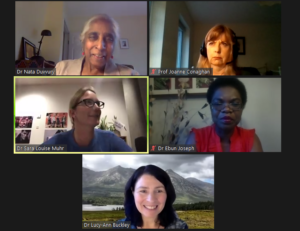Women, work and Covid-19: the beginning of the end for gender equality?

Top left to right: Dr Nata Duvvury, Prof Joanne Conaghan Second row left to right: Dr Sara Louise Muhr, Dr Ebun Joseph Bottom row: Dr Lucy-Ann Buckley
On 19 November, the Whitaker Institute hosted a live webinar Women, work and Covid-19: the beginning of the end for gender equality? As Covid-19 continues to affect the world of work, it is evident that the pandemic and its economic effects disproportionately affect women. Much of the pandemic’s unequal impact stems from the unequal distribution of unpaid caring work, exacerbated by the closure of schools and childcare facilities. Although these are now open again, children displaying potential symptoms of Covid-19 are likely to be excluded for several weeks, and schools and childcare facilities may also be closed at any time where there is a Covid-19 diagnosis, or where the government thinks appropriate. The ability to work therefore remains highly contingent for many women.
Women are also more likely to work in the sectors most affected by the pandemic, which are largely service-related, meaning that they are more likely to be impacted by lay-offs and job losses. However, even in less affected sectors, those with caring responsibilities have found it difficult to access work. Women’s overall employment participation is severely impacted, and the problem is compounded by women’s comparatively lower access to social security, which makes it harder for women to absorb economic shocks. For this reason, the International Labour Organisation has warned that Covid-19 could wipe out the ‘modest progress’ made on gender equality at work in recent decades.
While much attention has centred on the impact of Covid-19 on women’s employment generally, there has been less focus on other factors, such as disability and race, which significantly increase the disadvantage to some groups. Women with disabilities, Black women, and women from ethnic minorities are among the most likely to be excluded from employment at any time, and face particular challenges in the context of Covid-19. At a time when much of the focus is on simply ‘getting the economy running’ again, there is a danger that women will – yet again – be left behind, and that the compound disadvantage faced by some women will be overlooked entirely.
The webinar included presentations from four experts followed by a question and answer period. The event is available to watch back below.
Speakers
Prof Joanne Conaghan, University of Bristol
Dr Nata Duvvury, NUI Galway
Dr Sara Louise Muhr, Copenhagen University
Dr Ebun Joseph, Director, Institute of Antiracism and Black Studies
Chaired by Dr Lucy-Ann Buckley, NUI Galway

